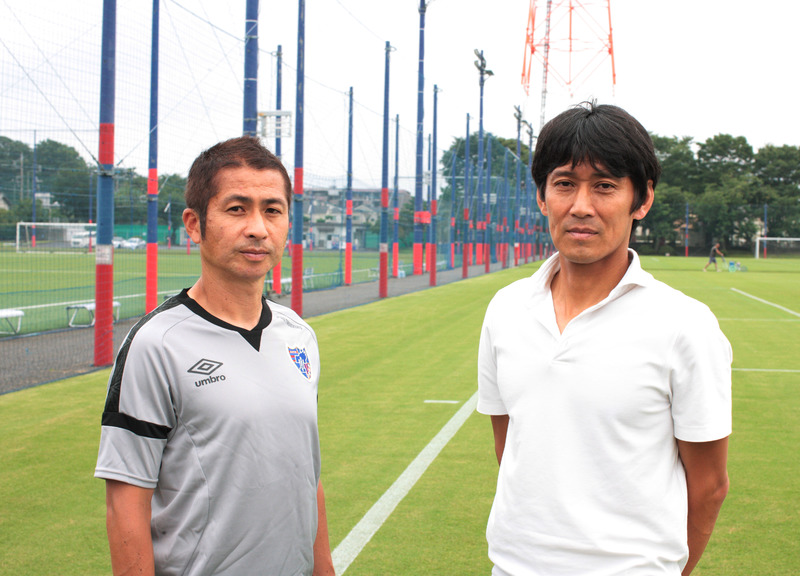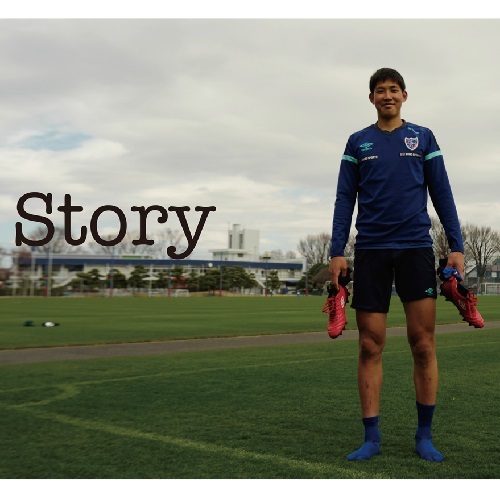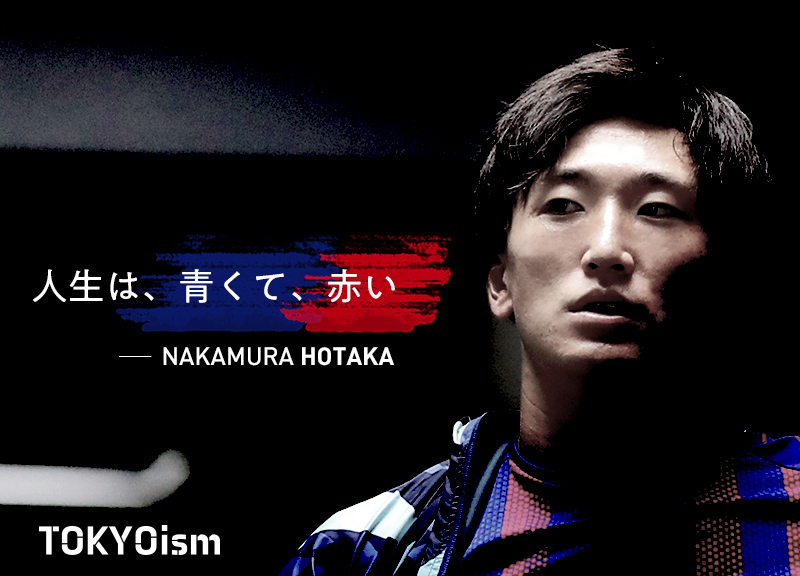Number 8 and 7 were always together. Ryuji FUJIYAMA and Satoru ASARI shared the same meals and spent many nights talking. They were like blue and red, with different personalities and playing styles, but strangely got along well. In 1997, the team set the goal of "becoming a strong and beloved team". Let's look back on the footsteps of these two who walked together with those words.
Rise to the Top: The Half-Life of Soccer
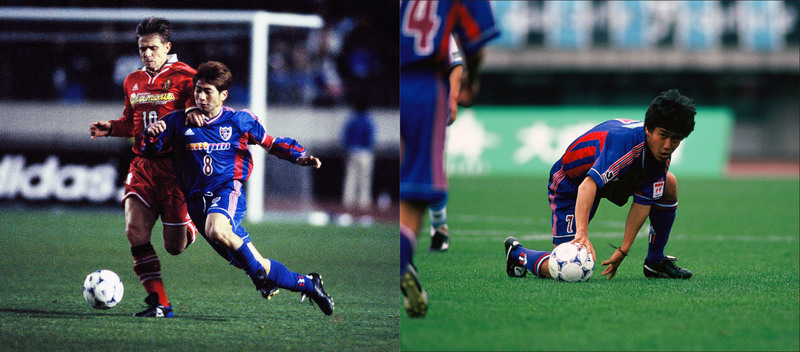
Do you remember when you joined the Tokyo Gas Soccer Club?
Fujiyama"At that time, I was not chosen as a player, as the J-League opening was scheduled for the following year. There were also few clubs, and for high school players, becoming a professional was a narrow gate. I couldn't enter that. So, the choices after high school graduation were either to go to a university in Kyushu or to get a job. I took the exam and joined the Tokyo Gas Soccer Club in 1992."
Asari"After graduating from high school, I went on to university, but I wasn't that good of a player. I just vaguely thought that it would be nice to continue playing soccer after graduation. I was also invited by a J2 club, but I received an offer from Tokyo Gas to join as a "corporate player," so I joined in 1997."
What was the atmosphere like at the time for the Tokyo Gas Soccer Club?
FUJIYAMA "It's completely different from now (bitter smile)"
ASARI "It was fun, but living in the dormitory was"
FUJIYAMA "After practice, we would collect 1,000 yen each and have a good time together."
――The preparatory office for the establishment was launched in 1997. Prior to that, Fuji-san (Fujiyama), who was the first to switch to a professional contract, and Sari-san (Asari), who remained an employee player until the end of their active career. What were the reasons for each of their choices and decisions?
Fujiyama "At first, I didn't have confidence in myself, but fortunately, I was able to play in matches from my first year in the club. There, I gained confidence and thought I could aim higher. I participated in training with Urawa Reds and explored other options, and in 1994, I received an offer for a professional contract from Tokyo Gas."
Asari "Personally, since 1999 when it became FC Tokyo, I was able to focus on soccer, and in terms of the environment, there was no distinction between being a professional or an employee. In the team that changed its name to FC Tokyo, even though the contract form was different, I did the same things as everyone else as a member of the team. At that time, Tokuma SUZUKI, the head of the development department (currently the representative director and GM of Fagiano Okayama), told me that it wasn't necessary to switch from being an employee player to a professional contract. Even as an employee player, I continued to play soccer while feeling grateful for the opportunity to focus on soccer in that environment."
What have we valued since joining the J-League?
Satoru ASARI"Not giving up until the end, and continuing to do our best is something that we have always strived for since our time at Tokyo Gas. We have cherished that mentality. Personally, I think I have been a player who has lived by that alone."
Fujiyama"Even the fans and supporters at the time were happy with our sliding plays on the sidelines, and we understood that it was something we had to do. However, there were also voices from those around us saying that we should communicate more, and there was a level of strictness that we didn't have in the team at that time."
- Since being promoted to J1 in 2000, a rival has joined the same position every year. What was the reason for surviving until 09?
Asari "Really, it was every year. When the off-season came, I would think, 'Is it my position again... Is it this year too... I knew it would be like that.' It was a cycle like that."
Fujiyama "But we both had special plays. On one hand, there were things that couldn't be changed, but I believe we were also forced to change when necessary. I think we were blessed with encounters, starting with our coach Kura-san (Hisao KURAMATA, current Rikkyo University coach). That led to the birth of a center-back who is less than 170 centimeters tall. I believe I was able to desperately search for and establish a way that only I could do to survive in this world."
Asari "That interception by Fuji-san is really an amazing skill."
Fujiyama "Even that one play was something I created by desperately thinking to survive. That's why others can't imitate it. It's the same with Sari's sense of balance and positioning. Everyone has a different sense, and it's about how to shape that and turn it into a necessary weapon."
The day Fuji and Sari cried
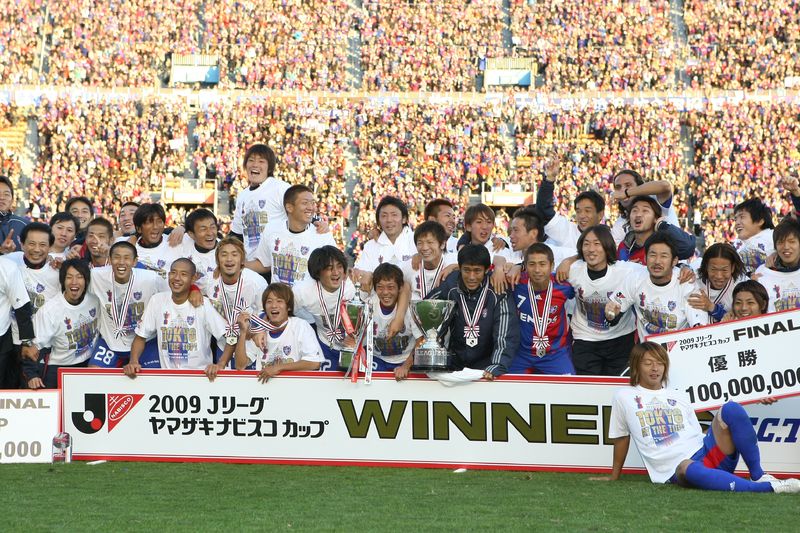
The journey we walked together. In the 2009 Yamazaki Nabisco Cup (now YBC Levain Cup), which was the last year for both of us in Tokyo, the team won its second championship. On that day, after the award ceremony, Fujiyama took off his game shirt and slowly walked down the stairs in his number 7 uniform. After the game, Asari's tears and words of professional pride were evident when he said, "I wanted to stand with Fuji-san in that place."
- Are there any memorable seasons in your active career?
Asari "The first year of J1 promotion was exciting and shocking in many ways. My best memory is winning the opening match against Yokohama F.Marinos by a narrow margin. That season, we defended well, and the forwards worked hard to score. Until then, we could compete on equal terms with teams of similar strength by playing our style of soccer. However, after being promoted to J1, we shifted to a style of play that focused on defense and utilized the characteristics of two or three forwards for quick attacks. There were many times when it didn't work, but especially in defense, I felt a bit of the results of what we had been doing until then."
Fujiyama "I was just going with the flow at that time (laughs). To be honest, I only started listening to others around the age of 30."
Asari "You were the captain for a long time, weren't you? (laughs)"
Fujiyama "It was just because I had been around for a long time that people lifted me up. Personally, winning my first title in the 2004 Yamazaki Nabisco Cup Final against Urawa was a turning point. I was able to increase my value as a soccer player, and I think that was when I felt that all my hard work until then had paid off."
Asari "I remember it too. I was watching from the stands due to an injury, and when Jean got sent off in the first half, I thought Fujisan would come on. Given the situation on such a big stage, I thought he would bring out more than usual, and that's exactly what happened."
Fujiyama "I was mentally prepared. Every year, I had to perform when a sudden opportunity arose. Maybe my body had learned to react in those moments without me realizing it. There was always a sense of crisis that if I didn't perform on such a stage, the younger players would take my position."
- During the end of their active careers, I have never seen either of them skip practice no matter how much pain they were in.
Asari "Fuji said he brought a suppository before practice today, laughing as he talked about it. That was a common occurrence."
Fujiyama "I really pushed my body to the limit. I tore my ACL and once had to be taken to the hospital after overexerting myself during summer training. But that was part of my appeal. I couldn't neglect that process if I wanted to earn playing opportunities. So, I have to be prepared to seize the chance when it comes. That was something I often discussed with Fumi-san (Fumitake MIURA, current coach of SC Sagamihara). It's not good to put effort in the wrong places, but if you don't put in the effort, opportunities will never come."
Asari "I always thought I had less ability than others, so I felt I had to practice harder than anyone else. I also believed that just competing on the same level as others wouldn't be enough to get on the field."
――And, behind the victory of the 2009 Yamazaki Nabisco Cup, which was the last year in Tokyo, Sarisan was excluded from the members.
Satoru ASARI "(It was in the dressing room the day before the match when the registered members were announced, right? I remember being comforted by Fuji-san, but I don't remember what was said."
Fujiyama "Not so much comforted, but we cried together, right?"
- That's news to me.
Fujiyama "That's true. We've been together for so long, always together since we were young, and our families got along well too. That's why I could feel Sari's frustration. I'm quite emotional myself (bitter smile)."
Asari "Because of that cup match, I announced my retirement from active play earlier, and we've been talking about bringing momentum to the team together from here on. So when I wasn't included in the lineup, I didn't know how to face the remaining days of my active career."
Fujiyama "There was pride in that, and since Sari has saved the team in crucial moments, I think he wanted to stand out even more in that situation. (Those tears) must have overflowed from what he believed in. It might have been the first time I saw Sari like that."
Asari "I was thinking of skipping the practice for the remaining members the next day, and even the practices after that. Honestly, I thought, what have I been doing for all these years? I was that down. I was persuaded by those around me, but I had already told the coach, 'It's impossible now.' Still, I don't clearly remember why I went to practice on the day of the Final Round, but I think I suddenly stopped and reconsidered whether my soccer life should end in this way."
To connect to the next blue and red
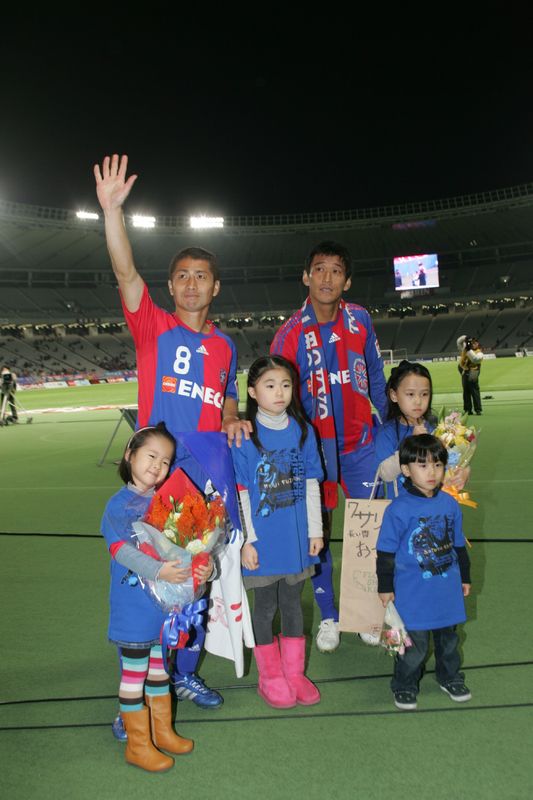
After retiring, the two who have become a part of history are now working to nurture the future of Tokyo. And they said, "We must continue to learn." They do not impose their ideas of "This is how Tokyo is," but instead continue to search in the dark for ways to build upon the history they have created and make new history. Their appearance has not changed at all from their active days.
――How was your active career with numbers 8 and 7?
Fujiyama "It was over in an instant"
Asari "Since Fujisan was here from the moment I joined, I can't even imagine how I would have approached soccer without him"
Fujiyama "He was always a given presence. I understand that, and he understands me"
Asari "Whenever Fujisan was doing something, it always made me think that I needed to practice more. Even when I injured my foot, what Fujisan always said was that the last time you can't stand on the field is when it really matters. I heard that if you give opportunities to the younger players, you lose your place. So, as long as Fujisan is here, I thought I had to stand on the field no matter how much my foot hurt"
Fujiyama "Having Sari by my side gave me a sense of security. Amaral (current head coach of Tonan Maebashi) is the same, but even now, I don't feel nostalgic when I meet him. It felt like a real family, so even when we reunite, it feels like meeting family or relatives. Every day was that much fun"
――What was it like for you after retirement?
Fujiyama "Now, Sari is my boss (laughs)"
Asari "No no (bitter smile). I think the club has changed through various experiences. As a member of the development department, I think about what I can focus on. Every day is a learning experience, and I think this place is a very important job that supports the club. Regardless of position, I am working hard with everyone to bring good players to the top team. I am also thinking about creating a comfortable working environment for coaches and creating various things in the future."
- Mr. Sari still cherishes the paper written with the club's guidelines created by Director Suzuki, doesn't he?
Asari "Even now, the development department is based on that guideline. On the occasion of our 20th anniversary, the club has adopted the slogan 'Aiming to be a strong and beloved team,' which has long been our motto. It has been a phrase since the Tokyo Gas era, and both Fujiyama and I have grown up with that phrase. I want to make sure we don't lose that essence and important parts. In particular, while the youth players are students, I want them to act with pride and responsibility for Tokyo. However, there is still so much more to do."
Fujiyama "Honestly, right after retirement, I wanted to be involved with the top team, but now I think it was good to study from the bottom up. I have experienced various categories as a player, so it suited me. As Sari said, there is a mountain of things we need to learn. For example, even if I talk about what I valued during my playing days to middle school students, they may not fully understand. But that also comes back to me. What struck me was the words from a coach I met: 'If the players can't do it, it's the coach's responsibility.' Even though I try to convey the passion I have cherished since my playing days, it's a difficult time to give harsh words. Still, with my parents' consent, there were times I spent a whole day without kicking a ball, just discussing things. I have truly progressed while always worrying as a coach. However, a few years later, players have come back to me saying, 'I finally understood what you talked about back then.' That made me happy."
A future nurtured by a diverse group of stones
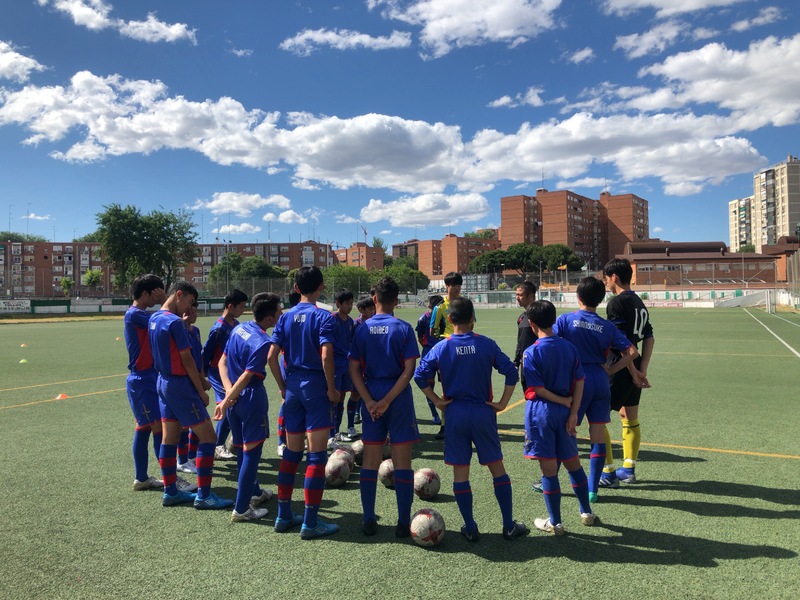
- What is important to you when dealing with each player?
Asari "Right now, the entire football world is focusing on developing individuals. It's about leveling up basic skills and tactics, and how to demonstrate that in matches. Today's children are truly better than we were. However, no matter how skilled they are, it means nothing if they can't perform in matches. During my playing days, I had many shortcomings compared to others. But I take pride in the unique traits I had that allowed me to continue as a player for a long time. That's why, while we fill in the gaps, we are also trying to enhance our strengths. It depends on whether we can create strong points to survive as professionals. For that, awareness is also important. Therefore, we need to cultivate the ability to think for ourselves. And we also need the practical ability to put that into action."
Fujiyama "The coaches in charge of each grade frequently hold individual meetings using the IDP (Individual Development Plan). This is a process of envisioning together what kind of player one wants to become in the top team. Since we aim for a certain player image, we discuss what efforts need to be made over a span of three months, for example. There, players and coaches have thorough discussions. However, this cannot be established without a relationship of trust. Right now, due to the spread of the new coronavirus, the inability to hold training camps or expeditions is a significant blow. The things that need to be communicated become fragmented, and it has become difficult to reach deep into their hearts. Players who overcome challenges and walls together and have even small success experiences will definitely grow, so that's my biggest concern right now."
Asari "Seeing (Taichi HARA) excel in the top team brings back nostalgia and joy. He continued to practice shooting diligently on his own and was able to appear in matches like that. Having players who think for themselves and take action inspires those around them and positively influences the entire team. Of course, I hope to see players with genius-like talent emerge, and we also need to nurture players who can put in that kind of effort. As Fujiyama said, I believe it depends on how much we can support the players in cultivating their thinking and practical abilities. I have few opportunities to actually stand in a coaching role, but I want to develop the players in front of us together with all the coaches while maintaining communication."
- If the top team can win the J1 for the first time, I think it will be a big effort for the current players, but at the same time, it will also be a historic victory.
Fujiyama "What we could leave for the top team is definitely not much. I would be happy if we could leave even a little something, but more than that, we are doing what we can do now. For example, we are also conveying to the children that 'there is nothing to gain from losing' and our commitment to competition. First of all, we need to cherish and nurture the hearts of the children we are currently involved with, one by one. That's about it."
Asari "Development is really difficult. That's why it's interesting. Friends like Fuji-san and Miya (Masashi MIYAZAWA, current FC Tokyo U-15 Fukagawa coach) are doing their best to somehow send even one player to the top team. I want them to instill even a little of what only Fuji-san can do, and I want them to leave something behind. If even one of those players can become a professional, they will be the players who support the club. I look forward to that in the future."
Fujiyama "I myself was never selected for the Japan national team, nor did I reach the league championship. That's why I want the children to realize it earlier and to dream big. I can only imagine how much fun it would have been if I could have played with more composure and a playful spirit during the game. However, we do not allow play that is only at the tips of the feet; players wearing this blue and red must fight earnestly and with grit. Based on that premise, I want to nurture players who are gritty yet have a playful spirit. We entrust our unfulfilled dreams of league championships and the Japan national team to them. I want them to carry that to the top team. Now, as it is said that the sense of belonging is gradually fading, to be strong and loved, we must love the club the most. There were some shortcomings, but that was something the family had back then."
Every year, even if it is put through the sieve, the uneven stones remain in the weave and have survived fierce competition. They are sweating to pass on the rough texture experience that is important in such a harsh world to the future. Number 8 holds the dream of "someday standing at Ajinomoto as a coach" and passes on all the passion to the children in front of him. At the retirement ceremony, number 7 blurts out, "I want to make my beloved club the best in Japan" and continues to spend his days learning. They are still aiming for a strongly loved team, and are running down that straight path with all their might.
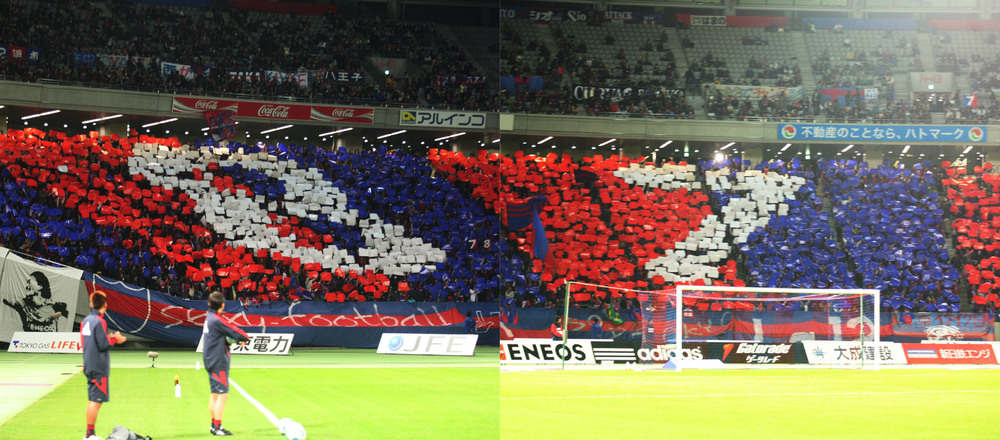
Ryuji FUJIYAMA Profile
Satoru ASARI Profile
Text by Kohei Baba
Photo by Kenichi Arai, Masahito Sasaki
